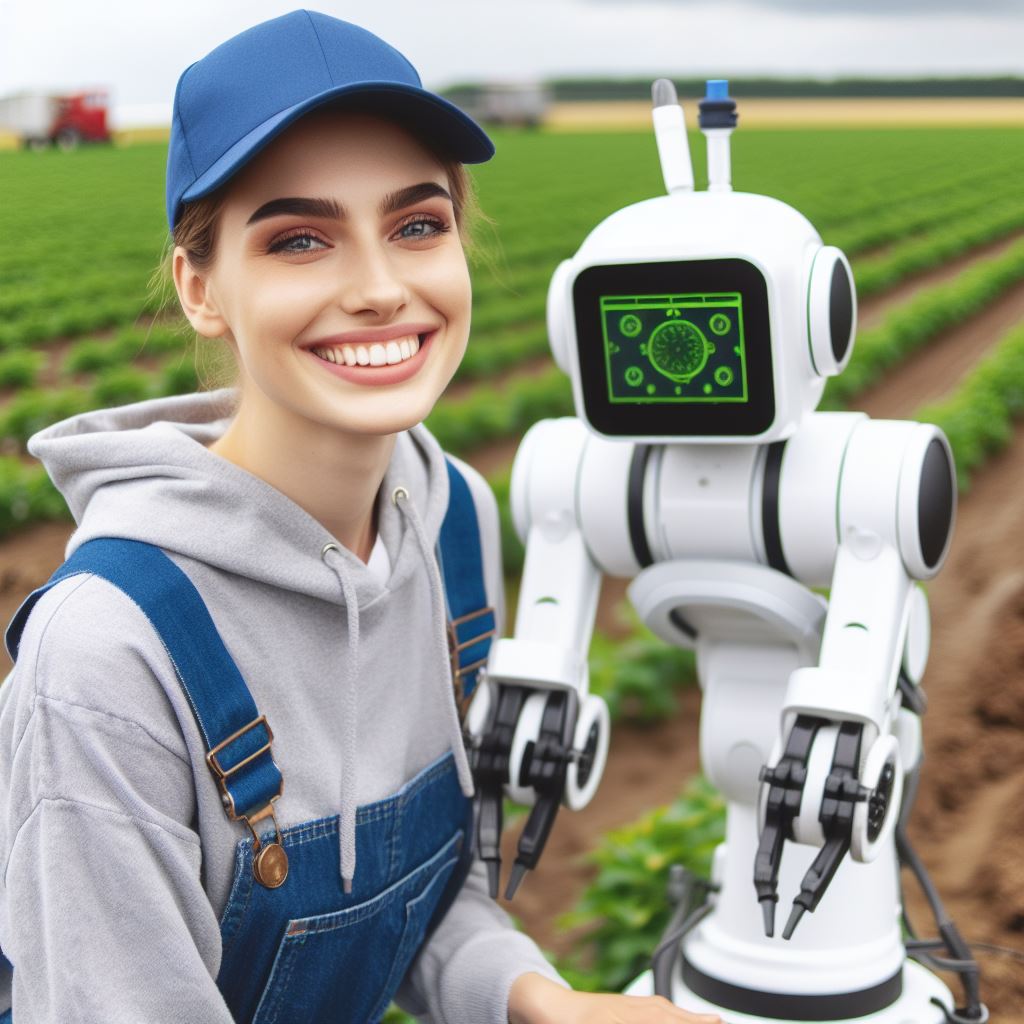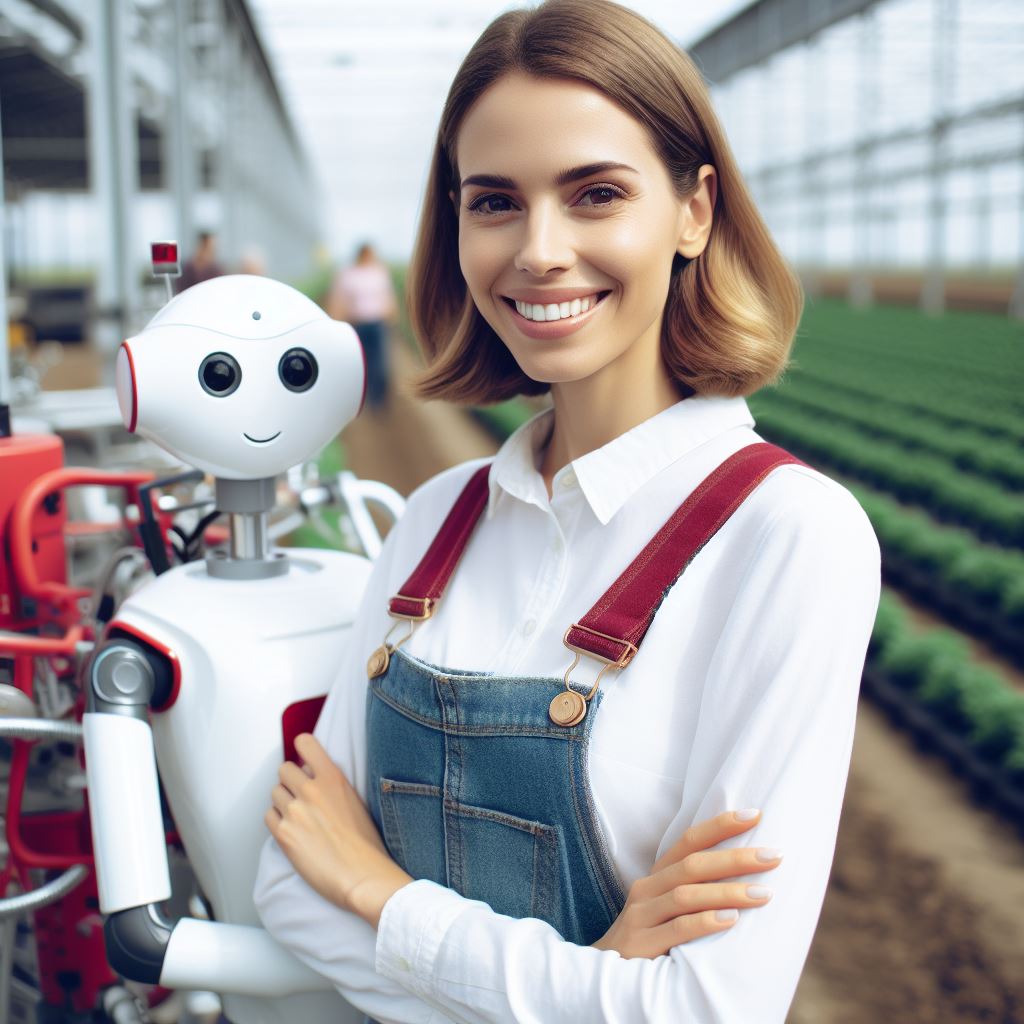Introduction
Biotechnology in agriculture refers to using genetic engineering and other biotechnological techniques to improve crops and livestock.
It plays a crucial role in modern agriculture, offering solutions to challenges such as pests, diseases, and food security.
Biotech in agriculture involves modifying the genetic makeup of plants and animals to enhance desirable traits, like productivity and resilience.
This modern twist brings about numerous benefits, including increased crop yields, reduced pesticide use, and improved nutritional content.
Biotechnology also aids in developing crops that can withstand environmental stresses, such as drought and extreme temperatures.
Moreover, it allows for the creation of crops with enhanced resistance to pests and diseases, reducing dependency on chemical interventions.
Biotech crops can contribute to food security by providing higher yields on limited land and minimizing post-harvest losses.
The development of genetically modified organisms (GMOs) has raised concerns about potential risks and ethical implications.
However, rigorous testing and regulations ensure the safety of these products.
Biotechnology in agriculture represents a significant advancement in modern farming practices, with the potential to address food scarcity, reduce environmental impacts, and improve overall agricultural efficiency.
By embracing biotech innovations, we can cultivate a more sustainable and resilient food system for future generations.
History of Biotech in Agriculture
Early developments in biotech
- The use of biotechnology in agriculture dates back thousands of years.
- Early civilizations used selective breeding to improve crops and animals.
- Gregor Mendel’s experiments with pea plants laid the foundation for modern genetics.
- In the early 1900s, scientists began exploring the concept of genetic engineering.
- They discovered that genes could be transferred between organisms, leading to breakthroughs in biotechnology.
Adoption and growth of biotech in agriculture
- In the 1970s, the first genetically modified organism (GMO) was created.
- This laid the groundwork for the adoption of biotechnology in agriculture.
- Biotech companies started developing genetically modified crops with desirable traits.
- These crops were resistant to pests, diseases, and environmental stressors.
- Farmers began adopting biotech seeds, seeing the benefits of improved yields and reduced chemical use.
Major milestones and breakthroughs in biotech
- In 1994, the first genetically modified crop, the Flavr Savr tomato, was commercialized.
- This tomato had an extended shelf life, reducing food waste and providing consumer convenience.
- Genetic engineering techniques continued to advance, allowing for more precise modifications.
- In 1996, herbicide-tolerant crops were introduced, enabling effective weed control.
- Biotech companies also developed crops with enhanced nutritional profiles, such as fortified rice.
- Golden rice, a genetically modified rice variety, was engineered to contain vitamin A, addressing malnutrition.
Biotechnology in agriculture has come a long way since its early beginnings.
By understanding its history and development, we can appreciate the significant role it plays in modern farming practices.
Read: CRISPR Crop Edits: Future of Farming Tech
Benefits of Biotech in Agriculture
In this section, we will explore the various benefits that biotechnology brings to agriculture.
Increased crop yield and productivity
One of the significant advantages of biotech in agriculture is its ability to increase crop yield and productivity.
Through genetic modification, scientists have developed crops that are more resistant to drought, pests, and diseases.
By introducing genes that enhance growth and resilience, biotech has revolutionized farming practices.
Farmers can now cultivate crops in regions where traditional methods would have been impossible due to harsh environmental conditions.
Enhanced resistance to pests and diseases
Biotechnology has also played a crucial role in improving plant resistance to pests and diseases.
Traditional farming practices often rely on pesticides, which can be harmful to human health and the environment.
Through genetic engineering, crops can now produce their pesticides, making them less susceptible to insect invasions.
This method not only reduces the need for chemical pesticides but also minimizes the risk of harmful residues on food products.
Reduction in the use of pesticides and fertilizers
Another benefit of biotech in agriculture is the significant reduction in the use of pesticides and fertilizers.
Traditional farming methods often require excessive amounts of these chemicals to maintain crop health and productivity.
Genetically modified crops have been developed to require fewer pesticides and fertilizers, as they are engineered to be more resistant and nutrient-efficient.
This reduction in chemical usage not only saves costs for farmers but also has a positive impact on the environment.
Improved nutrition and food quality
Biotechnology has also contributed to improved nutrition and food quality.
Through genetic modification, scientists have enhanced the nutritional value of crops, making them more beneficial to human health.
For instance, genetically modified crops can have increased levels of essential vitamins and minerals, addressing nutrient deficiencies in certain populations.
Additionally, biotech has been used to enhance the taste, color, and texture of fruits and vegetables, making them more appealing to consumers.
Environmental sustainability
Lastly, biotech in agriculture promotes environmental sustainability.
By reducing the use of pesticides and fertilizers, genetically modified crops contribute to a cleaner and healthier ecosystem.
Moreover, biotechnology allows for more efficient use of resources such as water and land.
Through developing crops that are drought-tolerant and can thrive in various soil conditions, biotech helps conserve water and prevents soil erosion.
Basically, the benefits of biotech in agriculture are far-reaching.
From increasing crop yield and productivity to improving food quality and promoting environmental sustainability, biotechnology has undeniably revolutionized modern farming practices.
Transform Your Agribusiness
Unlock your farm's potential with expert advice tailored to your needs. Get actionable steps that drive real results.
Get StartedRead: AI & Big Data: Farming’s Future
Biotech Approaches in Agriculture
Genetic engineering and modified crops
Genetic engineering is a biotech approach that involves modifying the DNA of organisms.
This technique has been widely used in agriculture to produce genetically modified (GM) crops.
GM crops are engineered to have specific traits, such as resistance to pests, diseases, or herbicides.
Through genetic engineering, scientists can introduce genes from other organisms into crops, enhancing their characteristics.
The development of GM crops has revolutionized agriculture by increasing crop yields, reducing pesticide usage, and improving food quality.
However, the use of GM crops has also raised concerns about their impact on the environment and human health.
Marker-assisted breeding
Marker-assisted breeding is another biotech approach in agriculture that involves using DNA markers to select desired traits in plants.
By identifying specific DNA markers associated with desirable traits, breeders can select plants with these markers and breed them, increasing the likelihood of obtaining offspring with the desired characteristics.
This technique allows for more efficient and targeted breeding, reducing the time and resources required compared to traditional breeding methods.
Marker-assisted breeding has been widely used to improve crop varieties, such as enhancing disease resistance, drought tolerance, and nutritional content.
Biopharming and bioremediation
Biopharming is a biotech approach that involves using genetically modified plants to produce pharmaceuticals or industrial compounds.
By introducing genes into plants, scientists can turn them into biofactories, producing valuable compounds in their tissues.
This technology has the potential to revolutionize the pharmaceutical industry by providing a more cost-effective and sustainable way to produce drugs.
On the other hand, bioremediation is a technique that uses genetically modified organisms to clean up pollutants or contaminants in the environment.
By engineering microorganisms or plants to degrade or absorb harmful substances, bioremediation offers a promising solution for environmental remediation.
Precision agriculture and smart farming
Precision agriculture, also known as smart farming, combines technology, data analysis, and biotech approaches to optimize farming practices.
By using sensors, drones, and satellite imagery, farmers can collect data on soil conditions, weather patterns, and crop health.
This information is then analyzed to make informed decisions regarding irrigation, fertilization, and pest control, among others.
Precision agriculture allows farmers to apply inputs more efficiently, minimizing waste and reducing environmental impact.
Furthermore, it enables the use of site-specific management practices, tailoring interventions to specific areas within a field, thus optimizing productivity.
In fact, biotech approaches have brought a modern twist to agriculture, revolutionizing the way crops are produced.
Genetic engineering and modified crops have increased yields, reduced pesticide usage, and improved food quality, although ethical and environmental concerns persist.
Marker-assisted breeding has accelerated the development of new crop varieties with desirable traits.
Biopharming and bioremediation hold great promise in the production of pharmaceuticals and environmental remediation.
Lastly, precision agriculture and smart farming enable farmers to make data-driven decisions, optimizing productivity and sustainability in agriculture.
Read: Tech Trends: AI & Crop Management

Controversies and Concerns
Potential risks and uncertainties
Biotechnology in agriculture, although promising, raises several potential risks and uncertainties that cannot be overlooked.
- Environmental impact: The use of genetically modified crops may result in unintended environmental consequences, such as the development of superweeds or the loss of biodiversity.
- Health risks: Some critics argue that consuming genetically modified foods could pose long-term health risks. However, scientific research has not provided concrete evidence to support this claim.
- Transgene transfer: There is a concern that genes from genetically modified crops could transfer to wild relatives, leading to the creation of new species that may disrupt ecosystems.
Socio-economic implications
The introduction of biotech in agriculture also brings about socio-economic implications that require attention and careful consideration.
- Patent ownership: Major biotech companies hold patents on genetically modified crops, raising concerns about the control they have over the global food supply. This dominance may limit small farmers’ access to essential seeds and perpetuate inequality.
- Consolidation in the agricultural industry: Biotech companies acquiring smaller seed companies can lead to reduced competition and could result in higher seed prices for farmers.
- Dependency on technology: As farmers increasingly rely on genetically modified crops, they become more dependent on biotech companies for their farming practices. This reliance could limit their freedom to choose alternative methods and restrict innovation.
Ethical considerations
Biotechnology in agriculture also prompts ethical considerations that society must grapple with.
- Playing with nature: Some argue that genetically modifying crops goes against the natural order of things and interferes with the fundamental principles of life.
- Animal welfare: The use of biotech in livestock production, such as genetically modifying animals for increased productivity, raises ethical concerns about animal welfare and the potential for unnecessary suffering.
- Access to food: Critics worry that biotech companies may prioritize profit over the greater good, leading to the commodification of food and compromising access to nutrition for vulnerable populations.
Consumer perception and labeling
One of the most significant controversies surrounding biotech in agriculture relates to consumer perception and the labeling of genetically modified organisms (GMOs).
- Lack of transparency: Many consumers desire transparency and the right to know whether the products they purchase contain genetically modified ingredients. However, some argue against mandatory labeling, claiming it may increase food costs and create unnecessary fear.
- Labeling standards: Establishing standardized guidelines for GMO labeling is a contentious issue. Different countries and regions have varying regulations, leading to inconsistencies and confusion for both consumers and producers.
- Consumer choice: Labeling GMO products allows consumers to make informed choices about the food they purchase. It empowers individuals to support or boycott certain agricultural practices based on their personal beliefs and preferences.
In short, the adoption of biotechnology in agriculture brings along controversies and concerns that demand careful consideration.
Evaluating potential risks, recognizing socio-economic implications, addressing ethical considerations, and dealing with consumer perception and labeling issues are vital for ensuring that biotech in agriculture can be harnessed responsibly and benefit society as a whole.
Read: Next-Gen Farming: The Role of Drones
Current Applications and Future Outlook
Growing biotech crops around the world
- Biotech crops have gained significant popularity, and their cultivation extends to various countries globally.
- Farmers in countries like the United States, Brazil, and Argentina have widely adopted biotech crops.
- These crops offer numerous benefits such as increased yield, reduced pesticide use, and improved nutritional value.
- Biotech crops like corn, soybeans, and cotton have become the top choices for many farmers worldwide.
- The adoption of these crops continues to expand, with a growing number of farmers recognizing their advantages.
Biotech in developing countries
- Biotechnology has the potential to address agricultural challenges faced by developing countries.
- Biofortification, for instance, can enhance crop nutritional value, combating malnutrition in these regions.
- Genetic engineering techniques enable the creation of crops resistant to pests, diseases, and harsh environmental conditions.
- Biotech tools allow these countries to improve crop productivity and increase food security.
- However, the adoption of biotech crops in developing nations faces regulatory hurdles and public acceptance issues.
Cutting-edge advancements and ongoing research
- The field of biotech in agriculture continuously evolves with new innovations and research breakthroughs.
- Scientists are developing genetically modified crops with improved traits like drought and heat tolerance.
- Precision breeding techniques, such as CRISPR-Cas9, enable precise and targeted genetic modifications.
- Biotech companies invest in research to tackle emerging challenges in agriculture, like climate change and plant diseases.
- Ongoing research focuses on enhancing crop productivity, nutritional quality, and sustainability.
Opportunities and challenges for biotech in agriculture
- Biotechnology offers immense opportunities for sustainable and efficient agricultural practices.
- It allows the development of crops with enhanced nutritional value, yield, and resilience.
- Biotech can contribute to addressing global challenges, such as feeding a growing population and reducing environmental impact.
- However, challenges like public perception, regulatory frameworks, and intellectual property rights hinder the widespread adoption of biotech.
- Collaboration between scientists, policymakers, and stakeholders is vital to effectively address these challenges and maximize biotech’s potential in agriculture.
In essence, biotech in agriculture has become a global phenomenon, with farmers adopting biotech crops worldwide.
Developing countries can benefit from biotech by addressing agricultural challenges and improving food security.
Ongoing research and advancements in the field open up new possibilities for sustainable and resilient crop production.
However, challenges such as regulatory barriers and public perception need to be overcome for biotech to reach its full potential in agriculture.
With collaborative efforts, biotechnology can revolutionize the way we grow food and address future agricultural needs.
Conclusion
Recap of key points discussed
We have explored the modern twist of biotech in agriculture, highlighting its benefits and challenges.
Biotech has revolutionized crop production, increasing yields, improving nutritional content, and reducing pesticide use.
It has also enabled the development of genetically modified organisms, offering resistance to pests, diseases, and extreme environmental conditions.
However, biotech in agriculture has faced criticism regarding its safety, environmental impacts, and ethical concerns.
Regulations and public perception play a crucial role in shaping the future of biotech in agriculture.
Overall assessment of biotech in agriculture
Despite the controversies, biotech has the potential to address global food security challenges.
It has already contributed to sustainable agriculture practices and the reduction of hunger worldwide.
However, careful consideration must be given to safety regulations, long-term impacts, and public acceptance.
Potential future developments and innovations
In the future, biotech in agriculture is likely to witness further innovations and advancements.
Gene editing technologies, such as CRISPR, hold tremendous potential for precise genetic modifications.
There is also an increasing focus on developing biotech solutions for climate change and soil degradation.
Sustainable biotech practices, such as precision farming and vertical farming, may become more widespread.
In review, biotech in agriculture offers immense opportunities for improving crop production, reducing environmental impacts, and ensuring global food security.
However, it requires responsible and transparent implementation, rigorous safety assessments, and addressing public concerns to foster trust and acceptance.
The future holds exciting prospects for biotech, with ongoing research and innovations paving the way for a more sustainable and resilient agricultural sector.




